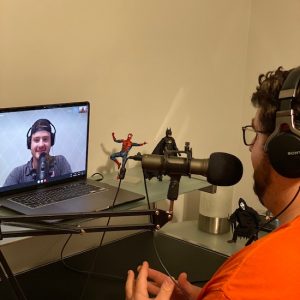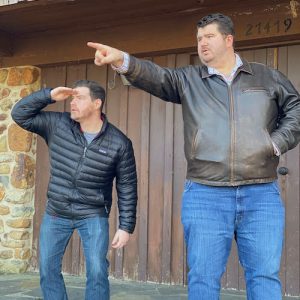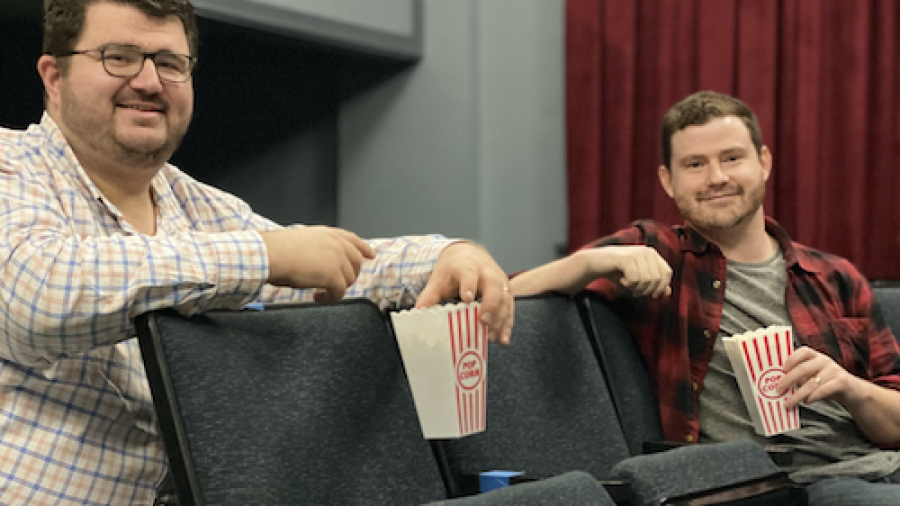Written by Melanie Carden
In the glorious sea of podcasts, Reel Rundown is an unbridled joyride. Price Ashe and Austin Davis—both of North Carolina—are co-captains on an all-you-can-watch buddy cruise of filmography and television. The pair, friends since the fifth grade, are following their passion for cinema and screen-based storytelling. Their podcast is an engaging hodgepodge of film critique, personal jabs, and real-life advice on what to watch. We settled in for a morning of critical review and lighthearted exchange on everything from cinema’s fate to Ashe’s unabashed man-crush on Gary Oldman.
Though more relaxed in tone than, say Siskel and Ebert from back-in-the-day, Ashe and Davis have a similarly edgy banter that audiences connect with. They each bring to the debate table experience in cinema—Ashe minored in film at North Carolina State, where he and Davis began making movies together. Their shorts, The Following and Stache Dreams, are available on YouTube. In classic film critic duo tradition, they don’t always agree. Davis, for example, loves No Country for Old Men while Ashe remains lukewarm. Both agree on Pixar’s engineered masterpieces’ marketability, though Ashe finds it easy to skip it altogether. Davis is your go-to resource for all things animation—with a deep well of passion and opinion alike for both cinema and the sharply written animated television series’ such as King of the Hill.

BTS during Reel Rundown recording.
On the impact that the COVID-19 pandemic has had—and will continue to have—on the film industry, they fully agree. The abrupt necessity to halt production on in-process films and rethink an entire facet of the entertainment industry would be unfathomable—if it weren’t for the fact we’re now experiencing it.
Davis and Ashe wonder if the COVID release structure is sustainable long-term and agree there will be both benefits and caveats moving forward. Both men credit the movie theater experience as a huge part of their passion for film—Ashe calling out 1989’s Batman specifically. I listen as they engage one another in a challenging discussion of film budgets and the need for return on investment.
Over the years, with the rise of theater ticket costs and big-screen home viewing, the cost versus reward ratio of the movie-going experience was already under scrutiny, pre-pandemic. Add to this the extraordinary and fairly smooth shift to releasing film to residential viewing to accommodate social distancing and safety requirements—where do movie theaters fit in on the heels of the pandemic?
Davis and Ashe express concern over the future of theaters. Davis feels strongly that “to survive, theaters are going to be forced to differentiate themselves from the convenience of video on demand.” This shift could result in [strictly] blockbusters primarily being released [in theaters]. Specifically, big budget movies that have established fan bases like Marvel.”
Yet, they both agree that the full movie theater experience—and the social nature of the setting—play a vital role in inspiring would-be moviemakers. Included here are the younger generations who fall so deeply in love with all things film after being fully engrossed by movie magic while seated in the plush rows of chairs alongside other moviegoers. Not only do kids need that fully immersive and communal setting, but everyone benefits from the amalgam of movie theater escapism and cinema magic. Davis hopes to, “…see theaters adapt…by enhancing the movie goer’s experience. Select theaters already provide amenities like seat warmers and waiters, so my guess is this could become more widespread.”
This is one of the areas on which the long-time friends agree. Ashe feels movie theaters will, “become a much more luxurious activity that only shows the big spectacle and franchise films like Marvel, Star Wars, and [the] Fast and the Furious [franchise]. I think it’s been headed that way for some time but COVID-19 has helped speed that process along.”

Indeed, the viability of streaming opens doors for more moviemakers overall—gifting to viewers an artistic treasure trove. Ashe sings the praises of the quality of the home-screen product, “…we’ve already seen big name directors like Martin Scorsese, Noah Baumach and The Coen Brothers take their latest features to streaming services. You can reach way more people that way.”
But there are some movies that we “need” to see on the big screen, and nearly every movie is more of an “experience” when viewed in a theater. Might the film industry reserve the big screen releases for big ‘splosions and Oscar bait, as Ashe suspects?
I agree with Ashe and Davis that streaming is here to stay (thank goodness). I further contend that it adds a layer of both savior and parasitism—a duality that the film and television industries will need to balance. Will the film industry be able to get people to return to the theater seats—with the rising cost of tickets combined with the home viewing experience expanding? Surely people have made improvements to their man-caves and TV rooms during the pandemic—be it through family hand-me-downs or outright purchase.
Will Netflix become the audition stage for the big screen? If a film or actor is bankable on Netflix, do they get promoted to the big screen? This would be a slippery slope, according to Ashe, “would a filmmaker such as Quentin Tarantino make the cut?” He goes on to lament, “Gone are the days of taking the whole family to the theater when you can sit in comfort and watch the latest film releases in your living room on a big screen TV with surround sound.”
The bottom line: we need the movie theater experience—for inspiration, escapism, and a sense of film community, and we need streaming for affordable, near-limitless access to artistic exploration.

Price Ashe and Austin Davis of Reel Rundown.
And while this gets sorted, Ashe and Davis are here, helping us navigate it all. Now more than ever, podcasts and entertainment reviews are crucial. With an endless sea of available content, we need the likes of Reel Rundown to help us navigate our way to finding our next escape, adventure, learning opportunity, or much-needed laugh. It is with such ease that Ashe and Davis weave critique and candor. Their friendship gives way to banter that is a welcome reprieve from daily stress, and at the end—you’re armed with film and television insight. On the heels of such a vigorous and worthy exchange, I’ve even forgiven them for leaving off What About Bob from both of their Bill Murray Top Ten Lists.
Looking ahead in the calendar, Ashe and Davis hope to return to their creative roots and expand on their YouTube efforts, complete with comedic shorts. And there just might be a screenplay in the works. In the meantime, audiences continue to be loyal to their biweekly podcasts.

